
William III, also widely known as William of Orange, was sovereign Prince of Orange from birth, Stadtholder of Holland, Zeeland, Utrecht, Guelders, and Overijssel in the Dutch Republic from the 1670s and King of England, Ireland, and Scotland from 1689 until his death in 1702. As King of Scotland, he is known as William II. He is sometimes informally known as "King Billy" in Ireland and Scotland. His victory at the Battle of the Boyne in 1690 is commemorated by Unionists, who display orange colours in his honour. Popular histories usually refer to his joint reign with his wife, Queen Mary II, as that of "William and Mary".

Middelburg is a city and municipality in the south-western Netherlands serving as the capital of the province of Zeeland. Situated on the central peninsula of the Zeeland province, Midden-Zeeland, it has a population of about 48,000.
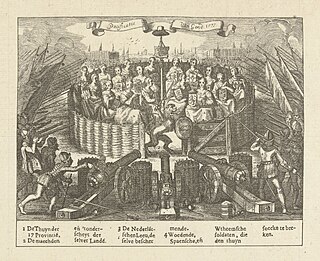
The Pacification of Ghent was an alliance of the provinces of the Habsburg Netherlands, signed on November 8, 1576. The alliance was formed to drive Spanish mercenary troops out of the country and to promote a formal peace with the rebelling provinces of Holland and Zeeland.
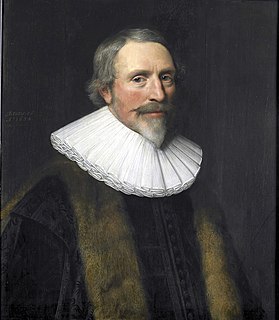
Jacob Cats was a Dutch poet, humorist, jurist and politician. He is most famous for his emblem books.

Laurens Pieter van de Spiegel was Grand Pensionary of Zeeland and, from 9 November 1787 to 4 February 1795, of Holland. He was an Orangist, which means that he was a supporter of Prince William V of Orange. He became grand pensionary of Holland when the Prussian army had reinstated William V in power in 1787. He fled to Germany in 1795, when the French defeated the Dutch army and an anti-Orangist revolution broke out. He died in Lingen, Prussia. Van de Spiegel was the last Grand Pensionary of the Republic of the Seven United Netherlands, which was replaced with the Batavian Republic modelled after the French revolutionary state.
Anthonie Duyck was Grand Pensionary of Holland between 1621 and 1629.

The Perpetual Edict was a resolution of the States of Holland passed on 5 August 1667 which abolished the office of Stadtholder in the province of Holland. At approximately the same time, a majority of provinces in the States General of the Netherlands agreed to declare the office of stadtholder incompatible with the office of Captain general of the Dutch Republic.

Henri de Fleury de Coulan, Sieur de Buat, St Sire et La Forest de Gay was a captain of horse in the army of the Dutch Republic, who became embroiled in a celebrated conspiracy during the First Stadtholderless Period to overthrow the regime of Grand Pensionary Johan de Witt in favor of future Stadtholder William III, known as the Buat Conspiracy. He was convicted of treason in 1666 and executed.
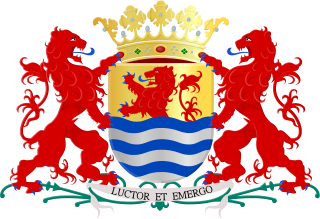
The Provincial Council of Zeeland, also known as the States of Zeeland, is the provincial council of Zeeland, Netherlands. It forms the legislative body of the province. Its 39 seats are distributed every four years in provincial elections.

The Dutch Republic Lion was the badge of the Union of Utrecht, the Republic of the Seven United Netherlands and is a precursor of the current coat of arms of the Kingdom the Netherlands.

The Dutch Republic was a confederation of seven provinces, which had their own governments and were very independent, and a number of so-called Generality Lands. These latter were governed directly by the States-General, the federal government. The States-General were seated in The Hague and consisted of representatives of each of the seven provinces.
Van den Spiegel, Van de Spiegel or Van der Spiegel is a surname. Literally meaning "from the mirror", it is thought to usually refer to the home of a mirror maker. Notable people with the surname include:

The Hof van Holland, Zeeland en West-Friesland was the High Court of the provinces of Holland and Zeeland, instituted as a separate entity of the government of the Counties of Holland and Zeeland in 1428, under the Burgundian and Habsburg Netherlands, and continued with little change under the Dutch Republic, Batavian Republic, and the Kingdom of Holland, until its dissolution in 1811 by the First French Empire. It should not be confused with the Hoge Raad van Holland en Zeeland which was the supreme court, founded in 1582 by the States-General of the Netherlands and intended for the entire Dutch Republic. The Hof was in practice the main Appellate court in Holland and Zeeland, and in number of cases-handled the most important in the entire Dutch Republic and its Precedents played an important role in the development of Roman-Dutch law, which is still influential in Southern Africa.

Paulus van de Perre was a Dutch politician and diplomat. He was one of the Dutch envoys who negotiated the Treaty of Westminster (1654) for the Dutch Republic with Lord Protector Oliver Cromwell.
Willem Nieupoort was a Dutch States Party politician, ambassador to the Commonwealth of England for the Dutch Republic and commissioner in the Dutch delegation that negotiated the Treaty of Westminster (1654) after the First Anglo-Dutch War.

The Act of Guarantee of the hereditary stadtholderate was a document from 1788, in which the seven provinces of the States General and the representative of Drenthe declared, amongst other things, that the admiralty and captain-generalship were hereditary, and together with the hereditary stadtholderate would henceforth be an integrated part of the constitution of the Dutch Republic. Moreover, members of the House of Orange-Nassau would have the exclusive privilege to hold the office. The Act was in force until the Batavian Republic was established in 1795.
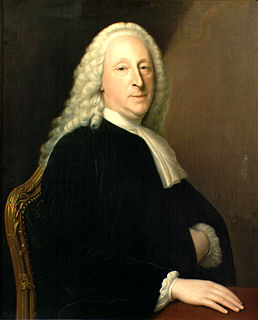
Wilhem (II) van Citters was a Dutch politician, who served as grand pensionary of Zeeland from 1760 to 1766.
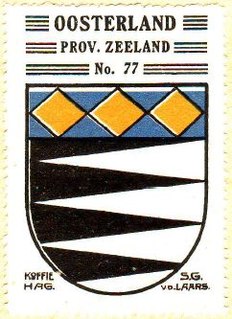
Bonifacius de Jonge, Heer of Oosterland and Heer-Jansland in Zeeland was raadpensionaris of Zeeland province in the Dutch Republic between 1615 and 1625.
Hendrik August baron van Kinckel, born as Heinrich August Künckelin , though of German extraction, was a Dutch naval officer and reformer, diplomat, and British confidential agent.
Albrecht van Loo was a Dutch Grand pensionary.















